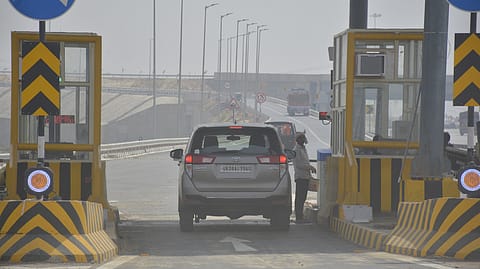Maharashtra announces toll waiver for light motor vehicles at 5 booths in Mumbai
The toll waiver will take effect from midnight on Monday and will apply to vehicles such as cars, jeeps, vans, and small trucks

A complete toll exemption for light motor vehicles at all five toll booths entering Mumbai was announced by Maharashtra Chief Minister Eknath Shinde on Monday. This announcement was made during a state cabinet meeting held in Mumbai, ahead of the upcoming assembly elections.
The toll waiver will take effect from midnight on Monday and will apply to vehicles such as cars, jeeps, vans, and small trucks. This exemption will extend to the Dahisar, Anand Nagar, Vaishali, Airoli, and Mulund toll booths. However, the Atal Setu toll will not be part of this waiver.
This decision is timely as the city gears up for heightened travel during the festive season, particularly leading up to Diwali, and is anticipated to facilitate smoother commuting in and out of Mumbai.
From several political parties, including the Maharashtra Navnirman Sena and leaders from both factions of the Shiv Sena, the demand for a toll waiver has been ongoing for quite some time. Recently, Aaditya Thackeray, a leader of Shiv Sena (UBT), also emphasised the need to eliminate toll charges at the city's entry points.
Commuters using the Dahisar, LBS Road-Mulund, Eastern Express Highway-Mulund, Airoli Creek Bridge, and Vaishali toll booths will no longer have to pay toll fees due to this decision, offering relief to daily travellers.
Additionally, the Maharashtra cabinet expressed its dismay regarding the murder of former state minister Baba Siddique and passed a condolence resolution in response to the incident.
The Election Commission is set to announce the assembly poll date for Maharashtra soon, which is likely to be held in mid-November.
Recommended Stories
In June, it was reported that approximately 75% of toll revenue in India was generated from trucks and commercial vehicles, while only 25% came from cars. The Global Navigation Satellite System (GNSS) based electronic toll collection offered a barrier-free approach, charging road users based on the distance they travelled on tolled highway segments.
The NHAI plans to incorporate the GNSS-based Electronic Toll Collection (ETC) system into the existing FASTag ecosystem, initially using a hybrid model that allowed both RFID-based and GNSS-based ETC to function concurrently. Dedicated GNSS lanes were set up at toll plazas, enabling vehicles using the GNSS-based ETC to pass through without stopping. As the GNSS-based ETC system became more prevalent, all lanes were expected to be converted to GNSS lanes.
Dedicated GNSS lanes were established at toll plazas, allowing vehicles utilising the GNSS-based ETC to pass through without halting. GNSS-based Electronic Toll Collection in India will enable the seamless movement of vehicles on National Highways and is expected to offer numerous advantages to highway users, including barrier-free free-flow tolling for a more convenient riding experience and distance-based tolling.
It was expected that all lanes would eventually be transitioned to GNSS lanes as the GNSS-based Electronic Toll Collection (ETC) system gained traction.
(INR CR)